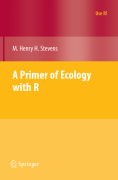
Ecology is more quantitative and theory-driven than ever before, and A Primerof Ecology with R combines an introduction to the major theoretical concepts in general ecology with the programming language R, a cutting edge Open Sourcetool. Starting with geometric growth and proceeding through stability of multispecies interactions and species-abundance distributions, this book demystifies and explains fundamental ideas in population and community ecology. Graduate students in ecology, along with upper division undergraduates and faculty, will all find this to be a useful overview of important topics. In addition to the most basic topics, this book includes construction and analysis of demographic matrix models, metapopulation and source-sink models, host-parasitoid anddisease models, multiple basins of attraction, storage effects and the successional niche, neutral theory, and diversity partitioning. Provides an introduction to the use of R to model ecological populations and their interactions Very useful for ecologists who already use R for statistical data analysis and ecological modelers who suffer from the limitations of their modeling software as well as teachers INDICE: Simple density independent growth.- Density-independent demography.- Density-dependent growth.- Populations in space.- Lotka-Volterra interspecific competition.- Enemy-victim interactions.- Food webs.- Multiple basins of attraction.- Competition, colonization, and finite rates of succession.- Community composition and diversity.
- ISBN: 978-0-387-89881-0
- Editorial: Springer
- Encuadernacion: Rústica
- Páginas: 401
- Fecha Publicación: 01/08/2009
- Nº Volúmenes: 1
- Idioma: Inglés
